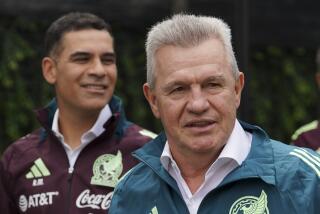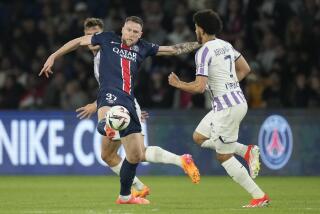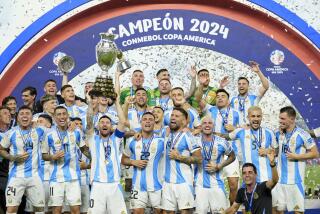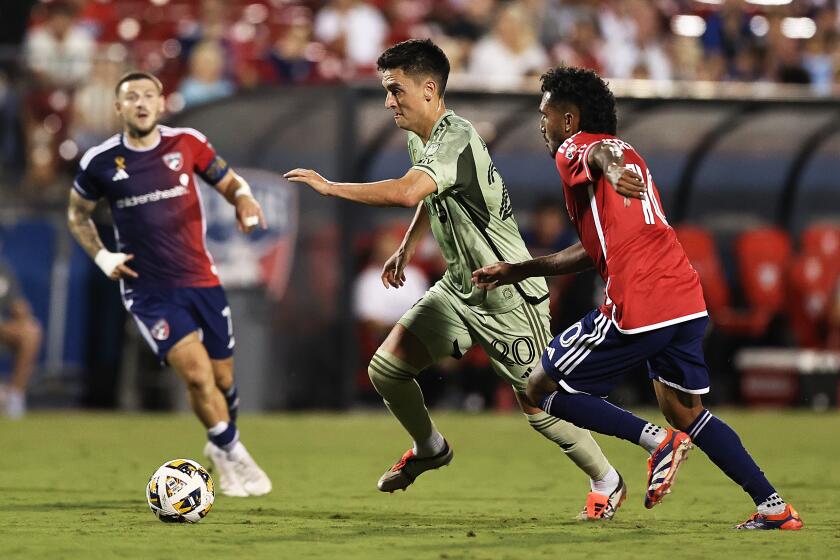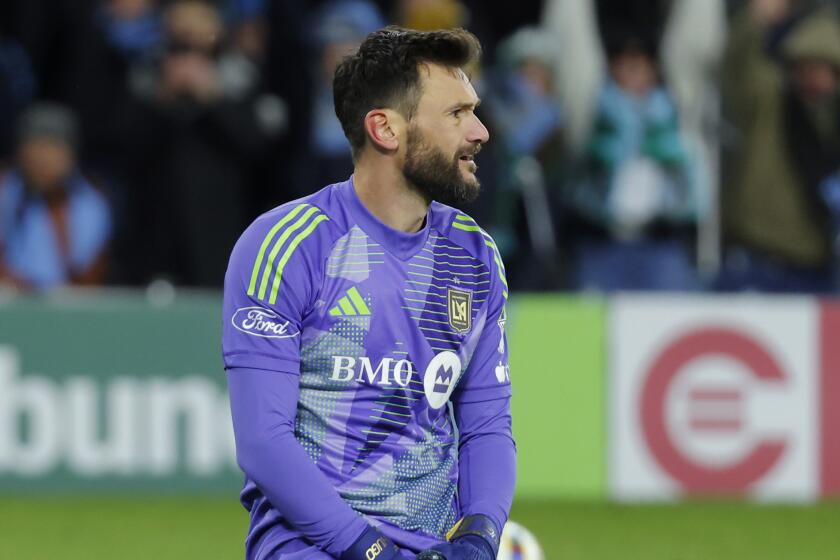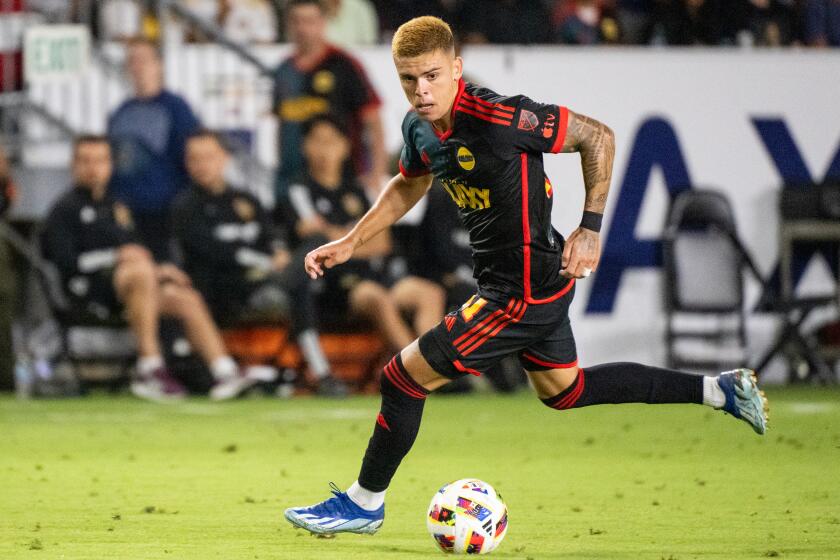Column: World Cup offers Argentina’s Lionel Messi the stage to be on the same level as countryman Diego Maradona
Diego Maradona, long retired as a playing star, still makes regular appearances on my news feed, often for doing or saying something stupid.
Kicking a security guard at a charity game to promote world peace. Brawling drunkenly on the streets of Croatia. Dancing at a political event staged by a Latin American dictator.
The stories make me strangely cheerful. The behavior is appalling but the spirit is familiar. It’s the spirit of a man who was absolutely joyful on the soccer field. Also incredibly arrogant, reckless, unafraid, petulant and unscrupulous.
There hasn’t been a personality like Maradona’s since. There hasn’t been a player like him, either. No one has dominated a World Cup the way he did the 1986 edition of the tournament.
Thirty-two years later, an attempt will be made by Lionel Messi, another diminutive left-footed attacker from Argentina.
Messi’s personality is as restrained as Maradona’s is uninhibited, and whereas the career of the self-indulgent Maradona was derailed by cocaine abuse, Messi has enjoyed a decade-long run as the undisputed No. 1 player in the world.
Still, there are suspicions that the unhinged part of Maradona’s character is what gave Maradona an extra little something that Messi lacks.
As is the case with every World Cup, this tournament will have an abundance of storylines. Germany will be trying to become the first repeat champion in 56 years. Spain will attempt to recreate its glory from eight years ago with a new generation of players. Brazil remains as pragmatic as it has been in recent tournaments, but has more offensive flair this time around with Neymar, Gabriel Jesus and Philippe Coutinho leading the attack. Inconsistent France has some top-of-the-line talents in Kylian Mbappe and Paul Pogba, who can win the tournament if they are in form.
But the most interesting drama pertains to Messi and whether he can have the World Cup that secures his place as the greatest to play the game.
Listen to Messi’s backers and they will tell you that the only reason there are still people who believe that Maradona was better than Messi is that Jorge Burruchaga scored on a breakaway in the 1986 World Cup final and Gonzalo Higuain didn’t on the same stage 28 years later.
That misses the entire point of the pro-Maradona argument. The World Cup trophy alone isn’t what separates Maradona from Messi. Romario and Zinedine Zidane were World Cup winners, too, and as sensational as they were in their prime, neither is considered Messi’s superior.
It’s not just that Maradona won the tournament. It’s how he won it, exerting a level of influence on games unmatched before or since. That would have included Messi even if Argentina hadn’t fallen to Germany in the 2014 final.
This isn’t a case in which a legacy has been enhanced by fading memories. Go back and watch the games Maradona played in that World Cup. He was everywhere on the field and almost every one of Argentina’s attacks went through him, as he played with the kind of freedom rarely afforded to players today.
His vision was unmatched and he was completely unpredictable. Entire defenses were structured to stop him, with West Germany calling on future world player of the year Lothar Matthaus to mark him in the 1986 final. Maradona scored five goals, including two in the quarterfinals and two in the semifinals, and there was probably no other player in the competition that could have scored any one of them. He was shut out in the final but was involved in the buildup of each goal in Argentina 3-2 victory.
The environment only magnified the heroics. Attacking players weren’t protected by the referees as they are now. In the Copa America Centenario final in 2016, Chile initially used extreme physicality to stop Messi and had a player red carded only 28 minutes into the game. Maradona was subjected to that kind of violence every game. Goalkeepers could still receive back passes from their teammates and pick up the ball with their hands. The since-amended offside rule of the time resulted in especially crowded midfields.
So when Messi takes the field for Argentina in this World Cup, this is what he is up against. However many goals Cristiano Ronaldo has scored or however many trophies Ronaldo has won, he isn’t in Messi’s class. Messi’s competition is history. Messi’s competition is Maradona.
Messi’s claim to being the greatest is based on accomplishments for the Spanish club Barcelona. The European Champions League has replaced the World Cup as the sport’s highest level of competition and Messi has won it four times.
Then again, club soccer has evolved over the last three decades, the formation of the Champions League, increased wealth of top teams and loosening of restrictions on foreign players creating the kind of loaded lineups previously unseen outside of Milan.
Messi’s Barcelona is better than any team Maradona played on. That also means Messi has never had to shoulder as much responsibility for Barcelona as Maradona did on any of his teams.
Think of any team that Maradona played on and you think of Maradona. Think of Barcelona’s best teams over the last decade and you think of Xavi and Andres Iniesta, the midfielders who most personified the team’s possession-based style.
Argentina’s national team has provided Messi with the platform to showcase the depth, and limitations, of his immense talent. Argentina’s obsession with Maradona has resulted in the team continuing to play with a free-roaming No. 10, what is known in the country as an enganche.
The No. 10 jersey and position has been Messi’s for the last two World Cup tournaments. He shined in the role four years ago, when he was clearly Argentina’s most influential player. But whereas Maradona’s dominance as the 1986 tournament progressed, Messi weakened. All four of Messi’s goals were scored in the group stage.
With Messi turning 31 this month, this almost certainly marks his last opportunity to make a World Cup his.
The elements are in place. There are worthy adversaries in Germany, Spain, Brazil and France. And, as was the case leading into the 1986 tournament, Argentina is perceived to have a weak team.
Argentina nearly didn’t get in the tournament, needing a victory against Ecuador in its final qualifying game to secure one of South America’s four guaranteed berths. Argentina fell behind early but Messi responded with a hat trick consisting of three sublime solo efforts.
The performance spared Argentina humiliation. Similar performances over the next month could end any debate about how he measures up to Maradona.

